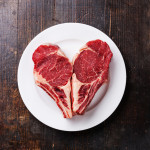By David Blyweiss, M.D., Advanced Natural Wellness
February 4, 2012
- It’s okay to eat meat… and enjoy it!
- Can over-cooked meat cause cancer?
- 4 ways to stop this deadly trend
I don’t have a problem with my patients enjoying a juicy steak, tasty lamb chop or half of a rack of baby-back ribs every now and then. I like sinking my teeth into these savory meats just as much as the next guy.
But if I’m going to chomp down on one of these delicious meals I want to make sure my health isn’t being compromised. And I don’t want you to allow today’s over-processed meats to compromise your health, either.
That’s why I always recommend sticking with the most natural meats available. Meat from grass-fed livestock and cage-free poultry are much healthier than today’s commercially processed meats.
The truth is I don’t want antibiotics, hormones, preservatives, genetically modified corn from animal feed or any other health-horrors to be anywhere near my dinner plate. And I don’t want them on your family dining table, either.
It’s also important to avoid highly processed meats. Bacon, ham, sausage, hot dogs and lunch meat all are highly processed. And that means they’re loaded with sodium nitrate which has a very strong link to colorectal and pancreatic cancer.
Today I’m going to share another health threat associated with meat consumption. And it has nothing whatsoever to do with the meat itself. It’s all in the way you cook it.
You see, depending on how you prepare your meat, you may be releasing a host of cancer-causing compounds that pose a very serious risk to your health.
MD Exposes the Hidden Danger to Your Eyes

When your eyesight starts to fail, it's a real problem. Suddenly you can't go to the grocery store... you can't get to the doctor if you have an emergency... you can't meet your friends for dinner…
Your "regular" doctor doesn't have time to keep up with the latest research. And the same goes for eye doctors. They go to school to learn how to fit you for glasses and contacts, but have no way of preventing the damage and loss of eyesight that threatens your freedom and independence.
Let me show you something that explains a LOT about how your eyes work.
In my FREE Special Report, I'll show you a HUGE, untapped resource for your eyes that safely and naturally restores clear, effortless eyesight.
Click here to get started...
Over-cooked meat has been linked to many types of cancer; including cancers of the breast, prostate, colon, pancreas and stomach.
Recent research shows men who eat more than 1.5 servings of pan-fried red meat per week increased their risk of advanced prostate cancer by 30%. And those who consume more than 2.5 servings of red meat a week have an even higher risk. You see, men who eat meat cooked at high temperatures are 40% percent more likely to have advanced prostate cancer.
Women are just as unlucky. Breast cancer appears to have a direct link with eating meat cooked at high temperatures.
Take the “Iowa Women’s Health Study” as an example. The women who consistently ate meats that were very well-done had a 4.62 times higher risk of breast cancer than those who ate their meat rare or medium done. And the more often they ate well-done meat, the greater the risk.
The question then, is why does well-done meat increase the risk of cancer?
Researchers have linked this increased cancer risk to chemicals released when meats are cooked at high temperatures. Especially when it comes to frying, broiling and grilling.
Surprisingly there are over a dozen cancer-causing chemicals classified as heterocyclic amines (HCAs) that form as meat is cooked. But there are several factors that come in to play. These include the type of meat, the cooking method, the temperature and the amount of time it is cooked.
All muscle meats produce these chemicals when cooked at high heat. That includes beef, fish, pork and poultry. It has to do with the way amino acids, sugars and creatine (which is found in the muscle) respond to extreme heat.
The longer you cook the meat and the higher the temperature, the more HCAs are produced.
Grilling is especially bad when it comes to HCA formation. That’s because the process involves extremely high heat and long cooking times. Grilling also releases other cancer-causing chemicals called polycyclic aromatic hydrocarbons (PAHs.)
Are You Suffering From...
- Love handles and a pot belly
- Romance that isn't what it used to
- Forgetfulness and inattention
- Low (or no) strength and endurance
- A sex drive that's shifted into neutral...or worse
If so...you may have Mature Male Burnout. Click here to discover more about this unique condition and what you can do about it.
When fat and juices drip into a hot fire while grilling or broiling meat, the rising smoke and flames produced PAHs. These are deposited on the meat and go right from the grill to your stomach. Charred portions of meat and fat are especially high in PAH.
However, research shows certain cooking methods can reduce the cancer-causing activity of these chemicals by up to 95%.
Cancer is a big concern today. Behind heart disease, it’s the second leading cause of death in the U.S. More than a half million Americans die each year of cancer. And in 2012 alone, an estimated 1.6 million new cases of cancer were diagnosed.
So anything you can do to stop this deadly trend and cut your risk is step in the right direction. And changing the way you cook your meat is one of the easiest things you can do.
Here are some cooking tips to and ensure you’re not cooking your way to cancer…
Microwave your meat before cooking. Place meat on in a dish and microwave it for a few minutes prior to placing it on the grill or in the frying pan. While in the microwave, the meat will release liquids that contain many of the precursors to HCAs. You should toss these drippings.
In studies, pre-microwaving reduces creatine, amino acids and sugar by about 30%. And cancer-causing activity was decreased by about 95%. That’s just five to six minutes of your time to prevent the #2 killer in the U.S.
Wrap grilling meat in foil. In addition to pre-cooking in the microwave, wrap your grilling meat in a protective layer of foil. This will help lower the production of PAHs by preventing fat and juice from dripping into the grill. It will also help reduce charring. Throw in your favorite toppings… onions, mushrooms, barbeque sauce or whatever else you prefer – then wrap it all up and toss it on grill.
Use a marinade. Marinade your meat with garlic, onion and lemon prior to cooking. Research shows beef marinated in a mixture of garlic, onion and lemon juice can reduce HCAs by about 70% during cooking. Just mix 31.2% onion, 28.6% garlic and 14.6% lemon juice. You can also use red wine, virgin olive oil, rosemary and other spices to reduce production of HCA in both beef and chicken.
Bake, poach or roast whenever possible. Slow cook methods such as baking, poaching and roasting release fewer cancer-causing chemicals than cooking foods a high heat. You can also cook your meat in a crock-pot or stew it over low heat to reduce chemical formation.
In the meantime, the HCA content in well-done meat is about 3.5 times higher than it is in meat that’s medium rare. So you can always choose to go for a little pink in your meat and remove any surface charring before chomping down. Just flip the meat constantly to decrease the formation of cancer-causing chemicals.
And don’t forget!
Avoid processed meats that contain sodium nitrate, choose your meats from grass-fed livestock and select poultry from cage-free birds.
When you put all of these tips together your body will thank you for it.
Resources:
Knize MG, Felton JS. Formation and human risk of carcinogenic heterocyclic amines formed from natural precursors in meat. Nutr Rev. 2005 May;63(5):158-65.
Joshi AD, Corral R, Catsburg C, Lewinger JP, Koo J, John EM, Ingles S, Stern MC. Red meat and poultry, cooking practices, genetic susceptibility and risk of prostate cancer: results from the California Collaborative Prostate Cancer Study. Carcinogenesis, Jul 20, 2012
Zheng W, Gustafson DR, Sinha R, Cerhan JR, Moore D, Hong CP, Anderson KE, Kushi LH, Sellers TA, Folsom AR. Well-done meat intake and the risk of breast cancer. J Natl Cancer Inst. 1998 Nov 18;90(22):1724-9
Felton JS, Fultz E, Dolbeare FA, Knize MG. Reduction of heterocyclic amine mutagens/carcinogens in fried beef patties by microwave pretreatment. Fd. Chem. Toxic., 1994;32:897-903.
Gibis M. Effect of oil marinades with garlic, onion, and lemon juice on the formation of heterocyclic aromatic amines in fried beef patties. J Agric Food Chem. 2007;55(25):10240-10247.
Puangsombat K, Gadgil P, Houser TA, Hunt MC, Smith JS. Occurrence of heterocyclic amines in cooked meat products. Meat Sci. 2012 Mar;90(3):739-46.






